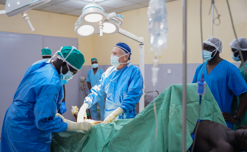After more than a decade of providing medical services in its standalone secondary care hospital in South Sudan’s Bentiu camp for internally displaced persons (IDPs), in Unity State, Médecins Sans Frontières (MSF) has completed a shift to a collaborative framework with the Ministry of Health (MoH) at Bentiu State Hospital (BSH).
According to a Monday press release extended to Radio Tamazuj, the transition, which began in July 2024 and was completed in June 2025, marks a significant step toward integrating MSF’s services into the national health system to promote sustainability and improve local capacity.
For over a decade, MSF has provided primary and secondary healthcare, including maternal, pediatric, surgical, HIV/TB, mental health, and inpatient services, at its standalone hospital in the camp. The move to BSH aims to strengthen the MoH’s role in delivering comprehensive care, ensuring that vulnerable populations in Bentiu and surrounding areas continue to access essential health services through a collaborative framework.
Emmanuel Omale, MSF Project Coordinator for Bentiu, emphasized that the transition to Bentiu State Hospital signifies a crucial step towards establishing a sustainable healthcare system rooted in local ownership, ensuring uninterrupted medical services beyond MSF’s presence, while enhancing capacity through training and expanding access to a broader population, including those in government-run facilities and the IDP camp.
“The transition lays a strong foundation for sustainable healthcare. MSF continues working in Bentiu state hospital in close collaboration with MoH to improve access to care, availability of services, and strengthen local capacity, aiming towards continuity of health care beyond MSF’s involvement,” he said. “It also means that more healthcare workers are gaining valuable training and capacity-building opportunities, and that a wider segment of the population can access care at the government-run hospital.”
In 2025, MSF teams have so far conducted over 21,698 consultations at Bentiu State Hospital (BSH), including 4,036 in the Emergency Room, 397 deliveries, and 981 surgical procedures in both Ex-PoC and Bentiu State Hospital. During this period, MSF also responded to numerous disease outbreaks, such as cholera, with 4,779 patients treated, the statement said.
Simon Puot, Medical Director of Bentiu State Hospital, expressed optimism about the transition.
“This shift from the Bentiu IDP camp to Bentiu State Hospital represents a significant milestone for our community,” Puot remarked. “We’ve seen notable improvements in hospital infrastructure, an increase in skilled staff, and a meaningful decline in mortality rates. When we have the necessary medicines, monitoring equipment, nurses, and doctors, lives are truly saved…This collaboration between the government and MSF ensures our people receive the quality care they deserve, and we remain committed to ongoing efforts to improve health outcomes for all.”
MSF said that despite this progress, challenges persist. The water, Sanitation, and Hygiene (WASH) situation remains dire in Bentiu IDP camp. The reduction of humanitarian support following funding cuts has further strained health infrastructure, impacting the rehabilitation of sanitation facilities and the provision of clean water.
MSF emphasizes the importance of renewed engagement from humanitarian and development actors to address these gaps and prevent service disruptions. The transition’s ultimate goal is to enhance emergency response capacity and ensure a resilient, sustainable health system that serves the needs of the most vulnerable.
“As MSF continues to support the health sector in Unity State, we remain committed to working in partnership with the MoH and local communities to improve health outcomes and uphold the right to quality healthcare for all,” the statement concluded.




